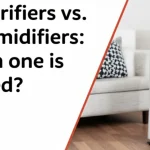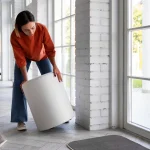
No one likes to stay sick all the time, especially when there are plenty of allergens in the air. These allergies are a significant concern for newborns with less immunity, pets, in short, every living being.
Pollen, dust mites, and mold spores are examples of environmental allergens that can affect pets and cause symptoms such as sneezing, itching, and respiratory problems.
These allergies can likewise impact humans, leading to comparable health issues and pain. For sensitive people, pet dander, saliva, and urine can cause allergic reactions that exacerbate hay fever and asthma.
By eliminating airborne pollutants and allergens from the home environment, air purifiers are essential in reducing these problems.
Dust, mold spores, pet allergens, and other irritants can all be removed by the best air purifiers for allergies. By enhancing respiratory health, lowering allergy symptoms, and enhancing general quality of life, air purifiers contribute to the creation of a healthier living environment for both pets and their owners.
BigWater‘s advanced air purifiers are made to fight a variety of allergens and pollutants, making homes safer and cozier.
Best Air Purifiers for Allergies
Keep reading further to find out the best air purifiers for allergies, which are listed below:
Air Purifier for Dust
One frequent indoor substance that can worsen allergies and respiratory disorders is dust. Dust is made up of different particles, such as microscopic creatures, cloth fibers, and skin cells.
An air purifier fitted with a high-efficiency particulate air (HEPA) filter can efficiently capture these particles, lowering their airborne concentration.
HEPA filters can capture 99.97% of particles as small as 0.3 microns. Air purifiers may dramatically reduce interior dust levels by cycling air through a filter, which results in cleaner air and fewer allergy symptoms. Frequent cleaning and dusting can be lessened with regular usage of an air purifier.
Air Purifier for Pet Hair
If you love pets but are afraid of getting sick from their fur, don’t worry. In this tech era, we have air purifiers to clean the air. Although pets’ hair can indeed accumulate quickly, it is not an allergy in and of itself; it can contain proteins from urine, saliva, and dander that trigger allergic reactions.
Indoor air quality can be improved by using HEPA and pre-filter air purifiers to capture pet hair and associated allergens.
Pre-filters catch larger particles like pet hair to prevent the HEPA filter from clogging. This extends the life of the primary filter and maintains the purifier’s efficacy.
Air purifiers reduce pet hair and dander in the air, helping lessen allergy symptoms and improve the comfort of sensitive people’s environments.
Air Purifier for Allergies
Sneezing, congestion, and itchy eyes are just a few of the symptoms that allergens, including pollen, mold spores, and dust mites, can bring on.
HEPA filters are commonly included in air purifiers intended for allergy relief to capture tiny particles. Certain versions additionally come with activated carbon filters to get rid of smells and chemical irritants.
These purifiers help allergy sufferers by continuously filtering the air and lowering the concentration of allergens.
Regular use can result in better sleep, fewer prescription drug needs, and improved general well-being.
Air Purifier for Smoke Smell
Smoke residue from wildfires, cooking, and tobacco can contain volatile organic compounds (VOCs) that can remain in the air and be hazardous. This can cause serious respiratory issues. Therefore, air purifiers with combined HEPA and activated carbon filters are suggested to remove smoke particles and odors efficiently.
HEPA filters capture microscopic particle matter, whereas activated carbon filters absorb odor-causing substances and volatile organic compounds (VOCs).
Its dual filtration technology ensures cleaner air and a more scented atmosphere, which is especially beneficial for those with respiratory conditions or who are sensitive to smoke.
Air Purifier for Mold Spores
One frequent indoor allergen that can worsen asthma symptoms and cause respiratory problems is mold spores.
Mold can grow and spread through the atmosphere in moist conditions. Air purifiers equipped with HEPA filters efficiently capture mold spores, stopping them from spreading throughout the house.
More sophisticated models incorporate ultraviolet (UV) light or photocatalytic oxidation technologies to eliminate mold spores and stop their growth.
These purifiers contribute to a healthier indoor environment and the avoidance of mold-related health issues by lowering airborne mold.
Air Purifier for Viruses
Airborne viruses can spread through respiratory droplets and linger in the air, increasing the risk of infection.
Air purifiers with HEPA filters can capture virus-sized particles, reducing their concentration indoors. Some models also incorporate UV-C light or other technologies to inactivate viruses.
While no air purifier can guarantee complete protection against viruses, using one as part of a comprehensive hygiene strategy can lower the risk of transmission.
This is particularly important in shared spaces or during flu seasons and pandemics.
Air Purifier for VOC Removal
Most consumer products found at home such as paints, cleaning materials, and furniture give out volatile organic compounds (VOCs).
Adverse health effects associated with exposure to VOCs are common, and for this reason, impacts like headaches, dizziness, and respiratory irritation can be expected whenever one is exposed to VOCs for a long time. VOCs are removed from the indoor air by filtration through air purifiers that use an activated carbon filter.
Air purifiers help enhance the living environment and decrease the probable long-term impact of VOCs by eliminating chemical impurities.
Air Purifier for Wildfire Smoke
Wildfire smoke is a suspension of fine particulate matter and gases that can penetrate the indoor environment and negatively impact the quality of indoor air.
It is, therefore, necessary to have air purifier with high efficiency filter for the removal of these pollutants and to safeguard health of people’s respiratory systems during wildfire episodes.
While the HEPA filters effectively eliminate small and light particles, activated carbon filters help to deal with vapor and smell.
During the wildfire season, an air purifier can help to enhance the quality of air that is circulating in the house, and is essential for persons with breathing difficulties.
Benefits of Air Purifiers
Apart from removing allergens, air purifiers have other functions that are worth considering. They can reduce foul smells, toxic chemicals, and particles in an interior environment.
This leads to general health improvement, improved sleep quality, and improved respiratory health.
It is equally important that pet owners make their homes suitable for people and their pets. Air purifiers are recommended to eliminate pet-induced allergies and odors.
They also work by trapping germs and viruses that cause airborne illnesses among family members. Having a good air purifier is a good idea, as this is a way of preparing for a healthier future.
Conclusion
It is important to remember that the indoors must always be clean to prevent unfavorable conditions for pets and pet owners. Air purifiers are critically important in cleaning the air of allergens, dust, different kinds of pollutants, and other kinds of smells, which helps make the environment safe and fit for habitation.
Air purifiers serve various purposes because they provide specific solutions for problems such as dust, pet hair, smoke, mold spores, viruses, and VOCs.Reach out to BigWater today to find the best air purifier for allergy needs, for air purifiers that suit your specific needs. It is time to check out our products to kick-start your journey to a cleaner and healthier home.





